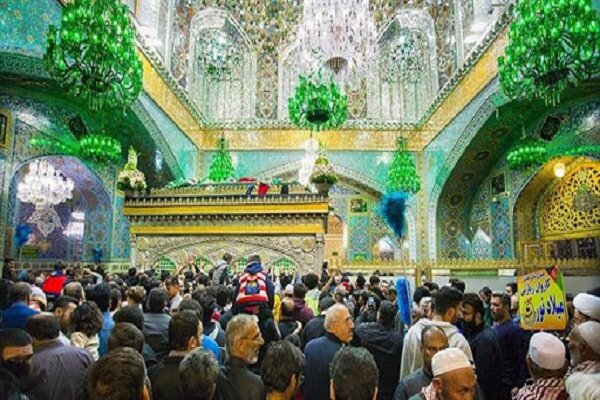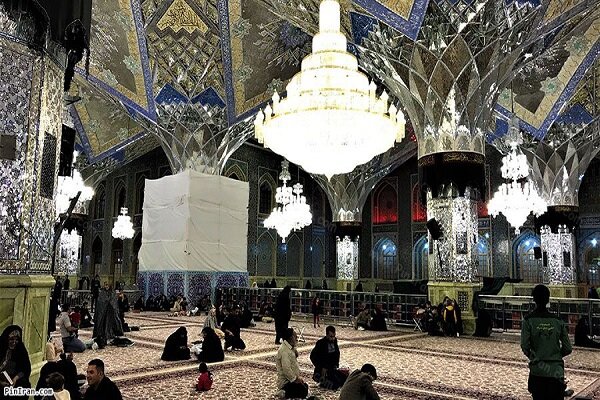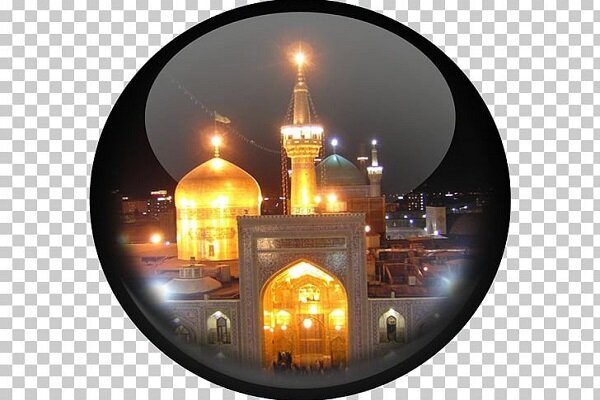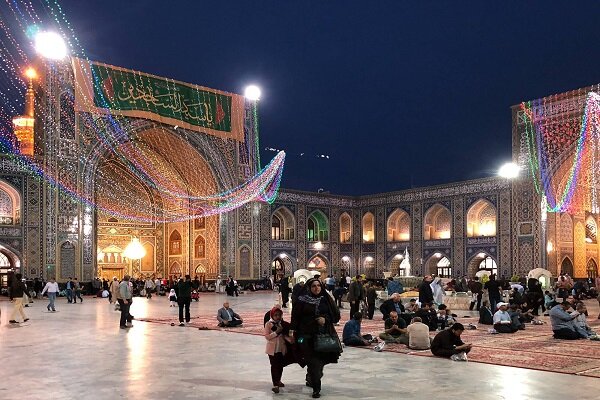According to the Iranian calendar, today Oct. 17 is coincided with the martyrdom anniversary of Eight Infallible Imam of Household of Holy Prophet, Imam Reza (Peace Be Upon Him).
Heartiest condolences to all Shia Muslims through the world on this occasion.

Imam Reza (PBUH) from Birth to Martyrdom
Imam Reza (PBUH) was born in 148 AH, i.e. about (1250) years ago in the city of Medina. His father was Imam Musa ibn Ja'far (PBUH), the seventh Imam of Shia Muslims and his mother was a noble and wise lady named Najma. Imam Reza (PBUH) was born in the same year that his grandfather, Imam Ja'far Sadegh (PBUH), was martyred.
Reading the life of Imam Ali ibn Musa al-Reza (PBUH), from the beginning up to his martyrdom, has very valuable and instructive points. The long period of Imamate of Imam Reza (PBUH) on the one hand, and the formation of deviant currents and political events on the other hand, has distinguished his life from the life of other Imams.
As mentioned above, Imam Reza (PBUH) was born in the year 148 AH, i.e. about (1250) years ago in the city of Medina and was martyred on the last day of Safar 203 AH. The eighth Imam of Infallible of Household of the Holy Prophet (PBUH) always sought the happiness and welfare of people in this world and the Hereafter with his blessed words during his lifetime.
Imam�s Names
His name is (Ali), but according to the custom among the Arabs, he was called (Abul Hassan). Such names are called (nicknames).
In addition to names and nicknames, people are sometimes given another name called (title). The eighth Imam has several titles. Among the most famous of these titles are (Reza), (Alem Al-Muhammad), (Gharib Al-Ghoarba), (Shams Al-Shomous) and (Moin Al-Zoafa). There is a special reason for naming each person by these names, i.e. name, nickname and title. It is said that he was nicknamed (Reza) because God is pleased with him. Imam's childhood, adolescence and youth passed in Medina. Good morals, abundant knowledge, faith and worship were many of the characteristics that characterized the Imam.

Moral Characteristic of Imam Reza (BPUH)
Much has been said about the good morals of the Imam. Here are some examples of what the Imam paid attention to in dealing with people. All of this is a lesson (how to live) for us:
- He (Imam Reza) never hurt others with his words.
- He did not interrupt anyone while speaking.
- He helped he needy a lot.
- He was sitting at a table with his servants and was eating food.
- He always had a smiling face.
- He never laughed with a loud voice.
- When sitting, he never stretched his legs in front of others.
- He never leaned against the wall in presence of others.
- He was visiting the patients perpetually.
- He was patient as well.
- Etc.
These were partial characteristics and morality of the eighth Imam of Shia Muslim Ali ibn Musa al-Reza (PBUH). With having these characteristics, should not God be pleased with this morality and behavior? And does not he deserve to be called (Reza)? Is not the one whom God pleases pleased with? This is how the name (Reza) is worthy and deserving for that great Imam.
Imam Reza (PBUH) in View of Poets
Since the time of Imam Reza (BPUH), poets and writers have written and authored a lot to describe the greatness of that Imam and each of them has described that Imam as good. There was a poet named (Abu Nawas) who was very component and capable of composing. He was told, �You have written poetry about everything, you have praised the mountains and the plains and music in your poems, but surprisingly, you have remained silent about an important subject such as the great personality of Imam Reza! While you know him well and are fully acquainted with the morals, behavior and greatness of the Prophet.�
Abu Nawas first replied, �I swear by God, only his greatness has prevented him from doing this, how can someone like me write a poem about a prominent figure like Imam Reza (PBUH)?� Then he said a poem, the summary of which means: Do not ask me to praise him, I cannot praise a man that Gabriel is a servant of his father.
Persian language poets also have composed many poems about Imam Reza (PBUH).
Spiritual Personality of Imam Reza (PBUH)
Imam Reza (PBUH) was also prominent in terms of paying attention to spiritual issues and dealing with matters of worship. Many narrations and stories of this aspect of Imam's life have been narrated in historical books, which are interesting for all of us to hear. When we see that our Imam and the leader who has accepted him as our leader and we have made his life our model, worship in this way and pays attention to the matters of worship in this way, we ourselves are forced to follow the same method and Learn the same way. Here are some examples of things historians have noticed in this regard:
- He was sleeping less at night and spending most of his precious time in worship.
- He fasted many days.
- His prostrations were very long.
- He was reciting the Holy Book a lot.
- He was adhering to the first prayers of the time.
- Except during prayers, he (Imam Reza) was pleased with prayers to God.

Scientific Personality of Imam Reza (PBUH)
Imam Reza (PBUH) had a special scientific position. He had a wealth of knowledge and his scientific prominence was better evident in his confrontation with scholars of other religions. Meetings and gatherings where various scholars and scientists came together to express their views and opinions, flourished at that time. The rulers of that time, sometimes to show the glory of their court, sometimes in order to attract scholars to the court, and sometimes in order to overcome someone's opinion, held scientific meetings along with other councils. These circles, known as meetings (debates), were the best place to express one's scientific merits.
In the time of Imam Reza (PBUH), when all scholars gathered and had a conversation and finally stopped in response to others, they would reach out to Imam Reza (PBUH) to testify to the truth of their matter. One of the most important and famous titles of Imam Reza (PBUH) is (Alem Al-Mohammad). The fact that Imam Reza is known as this title among all Shiite Imams is the reason for his prominence in terms of common knowledge in his time and finding an opportunity to reveal those sciences.
Abasalat, who is one of the companions of the Imam, narrates a narration from the nephew of Imam Reza (PBUH) that is readable. He said, �Imam Musa ibn Ja'far (PBUH) used to say to his children: Your brother, Ali ibn Musa (meaning Imam Reza), is the scholar of the family of Muhammad ... Learn your religious needs from him and remember what he teaches you, because my father Imam Sadegh (PBUH) used to say to me many times: Alem Al-e-Muhammad is in your generation and I wish I could see him.�
Abdul Salam Heravi narrated that he was present in most of the Imam's scientific meetings and I did not see anyone more knowledgeable than Imam Reza (PBUH) and every scientist who saw him testified to his superior knowledge. In the meetings attended by a group of scholars, jurists and scholars of different religions, all of them were defeated, to the point that all of them admitted and testified to their scientific incompetence and the superiority of the Imam.
One of the points that have been considered and recounted by everyone in the study of Imam's scientific personality is that Imam Reza (AS) spoke to each group in their own language and, according to Abasalat, the most eloquent and knowledgeable people in any language. And it was cultural. Abasalat, who says this himself, is surprised by the Imam's mastery in different languages, and expresses his surprise to the Imam, and the Imam replies: �I am God's authority over the people. How can such a person not understand their language?� Have you not heard that the Commander of the Faithful Ali (AS) said, �They have given us (chapter of speech) and it is nothing but familiarity with the language of others.�
Political Personality of Imam Reza (PBUH)
The whole life of Imam Reza (PBUH), whether when he had not yet reached the position of Imamate or when after the martyrdom of his noble father Imam Musa Kazem (PBUH), he was responsible for the leadership of Shiites, during the rule of the Abbasids. By claiming to belong to the Holy Prophet (PBUH) and taking advantage of the people's feelings against the Umayyads, the Abbasids were able to oust them from power and sit on the throne of Muslims themselves. With the suppression of the Umayyads, they no longer had the power to pose a significant threat to the Abbasids. The Abbasids considered the only threat to their rule to be the Shiites who, obeying the infallible Imams, considered the rulers of that time unjust and tried to overthrow them.
Therefore, the number one enemy of the Abbasid rulers were the Shiite Imams, and that is why all the Imams who lived in the time of these oppressive rulers were martyred by them. The Abbasids put so much pressure on the Shiites, threatening, torturing, persecuting, deporting, and displacing them that even historians are ashamed to retell it.
10 years from the time of the Imamate of Hazrat Reza (PBUH) coincided with the rule of Aaron. During these ten years, there was no suitable opportunity for an open and official struggle for Imam Reza (PBUH) and most of the Imam's political efforts were led secretly, but in the corners of Muslim lands, successive Shiite movements and uprisings narrowed the Abbasid rule. Brought and Aaron was confused in dealing with them.
Among all the Abbasid rulers, Ma'mun had a different face. He killed his brother, Amin, in order to come to power himself, and in dealing with the Shiites, and especially the person of Imam Reza (PBUH), entered in another way and took a different approach. Here are some examples of historians commenting on the complex character of Ma'mun to find out what mysterious man Imam Reza (PBUH) encountered.
One says: Ma'mun was superior to all Abbasids in terms of foresight, strong will, patience, knowledge, shrewdness, greatness, courage and chivalry. Another writes: Ma'mun, while attending luxury gatherings, was very interested in books, philosophy, debates, scientific debates, jurisprudential issues, and so on! Another says: Sometimes, like a compassionate believer, he rebuked people for failing in prayer and indulging in pleasures and following lusts, etc., and frightened them of divine punishment, and sometimes he himself participated in feasts.
Is it easy to coexist with such a complex and ambiguous creature who seeks nothing more than the stability of the Abbasid rule, but at the same time chooses his greatest opponent, the person of Imam Reza (PBUH), as his crown prince? However, with these characteristics, Ma'mun, after coming to power, and in order to stabilize the pillars of his government, decided to deal with Imam Reza (AS) in a different way. So, he wrote a letter to the Imam and appointed him as his crown prince. The Imam initially refused to accept this, but Ma'mun's pursuit and insistence and the Imam's refusal led Ma'mun to send two men to Medina on his behalf, who were in Khorasan, and they stated their intention to the Imam in this way. Ma'mun has ordered us to take you to Khorasan. The Imam, who knew the ways of the rulers and knew that Ma'mun, who was not afraid of killing his brother, did not give up on this decision, was forced to leave Medina.

Emigration of Imam Reza (PBUH) to Khorasan
When Imam Reza (PBUH) found himself forced to travel, in order to express his dissatisfaction with this trip, he visited the holy shrine of the Holy Prophet (PBUH) several times and made a pilgrimage in such a way that everyone understood that The journey is not to the Imam's satisfaction.
One of the witnesses narrates that I saw the Imam on a pilgrimage, approached him and congratulated him on the fact that the Imam was about to travel, but the Imam replied: �Leave me alone! I will leave the neighborhood of the Prophet (PBUH) and I will die in exile!�
After that, the Imam called all his relatives and friends and said to them, �Cry for me! Because I will not return to Medina. This shows that the Imam was familiar with Ma'mun's sinister plan, but had no choice but to accept his decision.�
The Imam left Medina with the envoys of Ma'mun and left for Khorasan. According to Ma'mun's order, the Imam's route from Medina to Khorasan was determined in such a way that the people of the Shiite cities were deprived of visiting the Imam. Because if the Shiites succeeded in visiting their Imam closely and meeting him and benefiting from his words, they would be more devoted to him, and this would be a great danger for the rule of Ma'mun. Therefore, the cities of Kufa and Qom were removed from the Imam's journey. But there is disagreement among historians as to which route the Imam reached Khorasan and the city of Merv. The following is a summary of the routes quoted for this trip:
Martyrdom of Imam Reza (PBUH)
Ma'mun, who saw more and more people turning to Imam Reza (PBUH), had no excuse against his fellow Muslims, the Abbasid dynasty. So he decided to go to Baghdad to talk to him closely. But what gift did he bring them on this journey? Could he remove the Imam from his guardianship? Could he have ignored the widespread allegiance he had taken from the people? Could he tolerate the reaction of the people to the removal of the Imam? Could he have given a convincing reason for the mass dissatisfaction of the Shiites and the followers of the Imam? This is where Ma'mun once again reveals his true face and turns to hidden violence and game politics.
He first kills his minister, Fadl ibn Sahl, and sheds tears over his body, and sets a reward for finding his killers, and when they are arrested, they testify that Ma'mun ordered them to do so. But he kills them in disbelief.
He then follows the plan to remove Imam Reza (PBUH), but tries to implement this plan in a way that shows that he is free from this. So on his way to Baghdad, he stops in Toos and poisons Imam Reza (PBUH) by eating poisonous pomegranate or grapes to the Imam, and liked what he did after the assassination of Fadl ibn Sahl, here too He sheds tears on the pure body of the Imam and buries him next to the grave of his father Harun Al-Rasheed.
Imam Reza (PBUH) had previously warned some of his companions about his martyrdom at the hands of Ma'mun. For example, he once said to two of his companions: Now is the time for me to return to God and it is time for me to join the grandfather of the Messenger of God (PBUH) and my fathers. The scroll of my life is done. This authoritarian ruler (Ma'mun) has decided to kill me with poisoned grapes and pomegranates.
Among the various quotations about the day, month and year of the martyrdom of Imam Reza (PBUH), the most famous is that he was martyred on Friday, the end of the Safar month of the year 203 AH, while 55 years have passed since the blessed life of the Imam. Is. According to all historians, the place of Imam's martyrdom was the city of Toos and his burial place was in the garden of Hamid ibn Qahtaba in Sanabad, which was later named (Mashhad Reza - the place of martyrdom of Imam Reza (PBUH) and is now known as Mashhad.
Source: MNA










